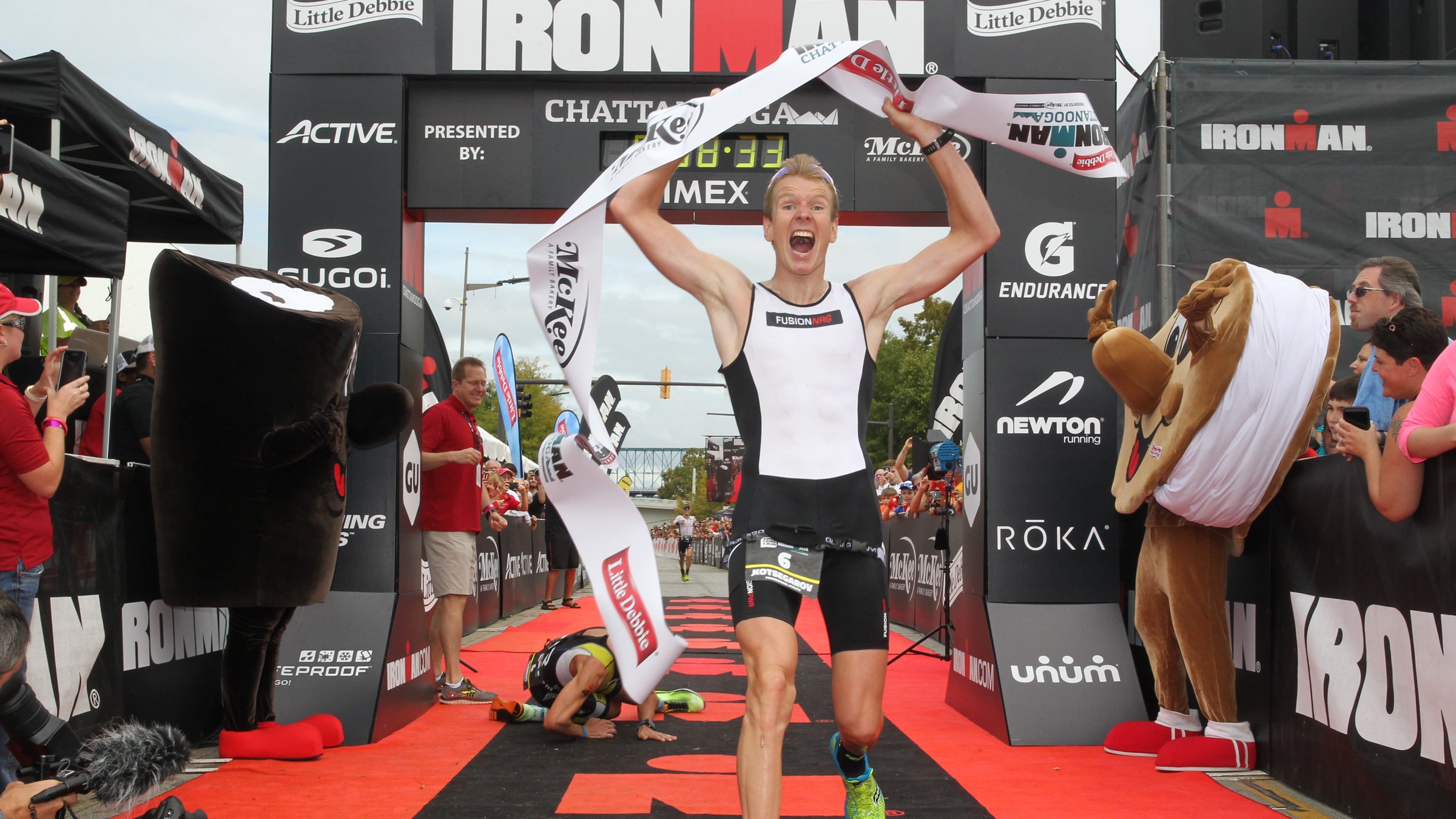Recalled: 3 Crazy Sprint Finishes

(Photo: FinisherPix)
Last weekends’s thrilling sprint finish between Canada’s Lionel Sanders and American Rudy Von Berg for second place at Oceanside 70.3 was rare in an endurance event where competitors are more often separated by minutes, not milliseconds. But it’s not a complete anomaly: Throughout the history of triathlon, we’ve seen down-to-the-wire sprints across the distances, from Ironman to Olympic. Here’s a breakdown of three (nearly) too-close-to-call finishes—and the lasting impact they made on those involved and the sport.
Ironman New Zealand
The Athletes: Pauli Kiuri (Finland) and Ken Glah (USA)
The Year: 1990
The Time Difference: Less than one second
The Finish Line Story: After running stride for stride in a psychological battle supreme for the final miles of the run, the race between Kiuri and Glah was all coming down to the final stretch. That’s when Kiuri accidentally veered off course into the crowd with just meters to go, leaving Glah looking like he had it all wrapped up as he cruised in solo. Meanwhile, Kiuri course corrected, threw in a lethal surge, and zoomed by Glah with inches to spare for the win, with a 2:53 marathon split. “I went mad. I was so angry because I felt I could win but had made this dumb mistake,” said Kiuri of the high-drama finish. “I pushed people aside and jumped the fence. Ken was about 15 meters ahead and I sprinted. He did not realize I was there until I was almost beside him. It was so confusing.” Post-race, Glah was a good sport about his loss, embracing Kiuri and commenting that he had other opportunities throughout the day to open up more of a gap on his rival.
The Impact: Glah, who went on to win seven Ironman races (including New Zealand in 1992 and 1993) and racked up 14 podium finishes in his career, said that the 1990 race was the most memorable because of the worldwide attention it garnered. “I was part of the closest race in the history of the sport and it was nice to be part of a great race,” he said. “It received such publicity and helped propel the sport and myself.”
Ironman Chattanooga
The Year: 2015
The Athletes: Kirill Kotsegarov (Estonia) and Matt Chrabot (USA)
The Time Difference: Less than two seconds
The Finish Line Story: 20 miles into the run that day, American pro Matt Chrabot seemed to have the race wrapped up. But his two-minute lead soon dissipated when he began to bonk, and his pace dropped from 6:30/mile to 7:30/mile. That was enough to allow Germany’s Stefan Schmid and Estonia’s Kirill Kotsegarov to catch him, and the three men raced shoulder-to-shoulder in the final 100 meters. Dropping Schmid with a few strides to go, Chrabot and Kirill were both in a full-on sprint as they approached the arch marking the finish line, Chrabot’s arms flailing as he made one last dive towards the tape. “In the end, Karill got me by a lean,” Chrabot said. “The final results say we were separated by two seconds, but it was actually less than that.”
The Impact: Even though the runner-up spot meant $10,000 less in prize money for Chrabot, he said he learned some valuable lessons about his grit that day. “All I know is that if you want a win badly enough, you can convince yourself to do just about anything,” he said. “Including willing your legs to sprint after eight hours of racing.”
RELATED: What It’s Like To Lose an Ironman By Less Than Two Seconds
Women’s Triathlon at the London Olympics
The Athletes: Nicola Spirig (Switzerland) and Lisa Norden (Sweden)
The Year: 2012
The Time Difference: Hundredths of a second
The Finish Line Story: In the closest Olympic triathlon finish to date, Switzerland’s Nicola Spirig and Sweden’s Lisa Norden came in so close that race officials had to analyze finish line footage frame-by-frame to determine the winner. In the end, it was Spirig, who literally nipped Norden by a hair. “It’s probably the most focused I’d been in my life,” Norden said afterwards of her mindset during the sprint. “There were so many people around us cheering and all I could focus on was that little line up ahead knowing I needed to get there as fast as I [could].” For her part, Spirig says she had prepared for a sprint finish in her training leading up to the Olympics, and during the race took advantage of the jumbotron position past the finish line to spy Norden creeping up on her, which is how she knew to turn on the afterburners at just the right time.
The Takeaway: Winning a gold medal is the ultimate achievement for any Olympian, but Norden said she wasn’t disappointed with her silver. “I was so pleased to have a medal. It was a good day and a dream come true,” she said. Spirig, who went on to finish second in Rio four years later and is next set to try to break the 8-hour barrier in the Phoenix Sub 8 Project in June, remarked about the lasting impression that split-second win made on the many fans who watched it unfold live (and in replays for years to come). “There was so much emotion from their side as well,” she said. “And that made me realize how much [what I do] inspires [other] people too.”
RELATED: Recalled: The Closest-Ever Olympic Triathlon Finish